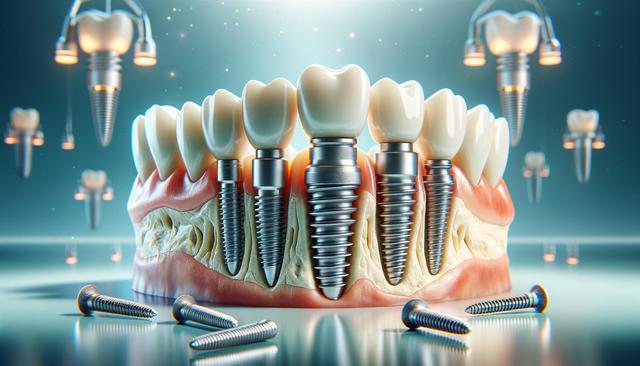Understanding What Dental Implants Are
Dental implants are artificial tooth roots, usually made of titanium, that are surgically placed into the jawbone to support a replacement tooth or bridge. Over time, the implant fuses with the jawbone through a process called osseointegration, creating a stable and long-lasting foundation for one or more artificial teeth. They are often recommended when someone has lost a tooth due to injury, decay, or disease and seeks a more permanent solution than dentures or bridges. Dental implants are known for their durability and natural appearance, making them a popular option for tooth restoration.
Unlike removable dentures, implants are fixed and function much like natural teeth. This means that they do not shift or move while eating or speaking. The structure typically includes three parts: the implant (root), the abutment (connector), and the crown (visible part). This design mimics the natural tooth structure and supports both function and aesthetics effectively. Many people appreciate the fact that implants help preserve the jawbone and prevent bone loss, which often occurs with missing teeth.
Who Is a Suitable Candidate for Dental Implants?
Determining whether someone is a suitable candidate for dental implants involves evaluating their overall health, oral condition, and bone structure. While implants are a widely used treatment, they are not ideal for everyone. Factors such as age, medical history, and lifestyle habits all play a role in the decision-making process.
Typically, ideal candidates for dental implants:
- Have one or more missing teeth
- Have healthy gums and sufficient bone to support the implant
- Do not have conditions that impair healing such as uncontrolled diabetes or autoimmune disorders
- Are non-smokers, or willing to quit smoking during the healing process
Even if a patient lacks sufficient bone density initially, procedures like bone grafting may make implants a viable option. A comprehensive evaluation by a dental professional, often including X-rays or 3D imaging, helps determine a personalized treatment plan. Children and young teens are usually not candidates because their jawbones are still developing.
Safety and Effectiveness of Dental Implants
Dental implants are considered a safe and highly effective treatment when performed by qualified professionals. They have been in use for decades and boast a high success rate—often reported to be above 90% for healthy individuals. The materials used, such as titanium, are biocompatible, meaning they are well-tolerated by the body and unlikely to cause allergic reactions or rejection.
Complications are rare but can include infection, nerve damage, or implant failure, particularly if aftercare instructions are not followed. Choosing a skilled dental surgeon and adhering to proper oral hygiene practices significantly reduces these risks. Patients are typically advised to follow a recovery plan that may include:
- Avoiding hard foods during the healing period
- Maintaining rigorous oral hygiene
- Attending follow-up visits to monitor healing
- Refraining from smoking and alcohol, which can impair healing
Long-term success also depends on lifestyle choices and regular dental check-ups. With proper care, dental implants can last many years, and in many cases, they can serve for decades without the need for replacement.
Costs and Considerations
The cost of dental implants can vary significantly depending on a range of factors, including the number of implants needed, the complexity of the procedure, geographic location, and the materials used. While generally more expensive upfront than other tooth replacement options, many patients find them cost-effective over time due to their durability and low maintenance requirements.
Some of the factors influencing the overall cost include:
- Initial consultation and diagnostic imaging
- Extraction of existing teeth, if necessary
- Bone grafting or sinus lifts (if required)
- Placement of the implant and crown
- Follow-up care and adjustments
Insurance coverage for dental implants varies. Some dental plans may cover part of the procedure, while others may not. It’s important to check with your provider and discuss potential financing options with your dental office. Many practices offer installment plans or third-party financing to make the treatment more accessible.
Benefits Beyond Aesthetics
While the visual appeal of dental implants is a strong advantage, their benefits extend far beyond appearance. One of the most significant advantages is the ability to eat, speak, and smile with confidence. Implants provide stability that closely imitates natural teeth, allowing for a wide variety of foods and a more natural speaking pattern.
Other notable benefits include:
- Preservation of jawbone density and facial structure
- Prevention of adjacent teeth shifting or becoming misaligned
- Improved oral hygiene as individual implants do not affect neighboring teeth
- High comfort level with no need for adhesives or removal
Additionally, implants support psychological well-being by reducing self-consciousness and improving quality of life. For many individuals, the ability to smile freely and chew without discomfort can have a positive impact on daily living and social interactions.
Conclusion: Is It the Right Choice for You?
Dental implants offer a reliable and lasting solution for those looking to replace missing teeth with a functional and natural-looking alternative. While not suitable for everyone, they are an excellent option for many individuals who meet the health and structural requirements. Weighing the long-term benefits against the initial investment is key to determining whether implants align with your needs and lifestyle.
Consulting with a qualified dental professional is the first step in exploring this treatment. With proper care and planning, dental implants can significantly enhance oral health, function, and confidence, making them a valuable consideration for those seeking a permanent tooth replacement solution.






